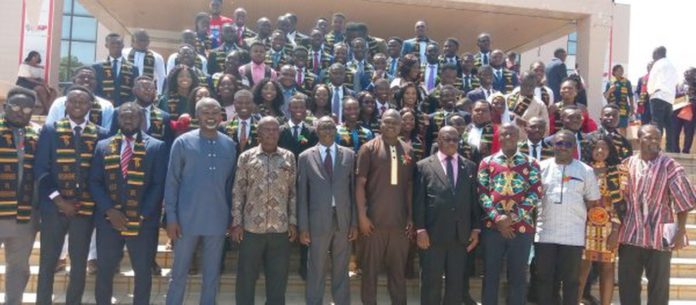The Allied Health Professions Council (AHPC) on Tuesday, November 9, 2021, inducted over 140 Doctor of Medical Laboratory Professionals from the University for Development Studies (UDS).
The event was held in Accra and graced by the World Health Organisation (WHO) Country Director, Dr Francis Chisaka Kasolo.
The programme is one of the harmonised Curricula by the West African Health Organisation (WAHO) in the ECOWAS region and was adopted by a resolution by the 7th Assembly of Health Ministers (AHM) in July 2006 (Abuja).
UDS is the University that first sought accreditations and approvals to start the programme in Africa and still remains the only tertiary institution in Ghana running it.
The adoption of the Doctor of Medical Laboratory Science (MLS.D) was necessary to restructure the bachelor’s degree programme into a six-year course.

It was to allow students to take all the undergraduate harmonised courses in the laboratory departments so as to produce well-rounded professionals with diversified skills for the labour market including self-employment.
It was to provide graduates with opportunities for enhanced clinical laboratory practice. The nomenclature is in consonance with the need for enhanced quality skills, the scope of the body of knowledge, duration of the training, course content, global best practices, and in line with development in health sector professional degree terminology (e.g. doctor of optometry, doctor of pharmacy, doctor of dentistry, etc).
For the purpose of specialization and development to Consultant cadre, MLS.D graduates would need to undertake further training at Ph.D. and/or Professional Fellowship levels.
Fortunately, the West African Postgraduate College of Medical Laboratory Science is established for the award of the sub-regional professional fellowship with an inaugurated Chapter in Ghana.
It is important that all respective agencies make it possible for the smooth running of this programme to serve the needs for which it was adopted.
Just as has been done by the Pharmacy Council, the AHPC is expected to give a directive to all training institutions to start the MLS.D and halt the training and award of the current 4-year bachelor’s degree.

This will go further to create the awareness for all institutions that matter to prepare for the training of the students and the government made ready to receive the graduates into the job market to offer their services.
It will also help for the planning for their 2-year mandatory internship across the many specialties that would equip them to serve. Key among them is the acceptance by the Ministry of Health and the Finance Ministry to make provisions for their period of internship.
Currently, many appear frustrated because the dust is yet to settle. But there is hope for the future as even the challenges and limitations could not stop the University from producing over 400 graduates as of now.
Many people, including highly respected people in academia, are confused with the nomenclature of the programme.
For the avoidance of doubt and to educate the public including prospective students, the following under-listed objectives are presented in the curriculum provided by WAHO.
The specific objectives for the introduction of the MLS.D curriculum are as follows:
- To stop quasi specialization at the first degree level as obtains presently in several universities and encourage the training of Medical Laboratory Scientists with broad orientation in all specialties in the field of Medical Laboratory Science.
- To introduce new areas that are deficient in the current programme e.g. molecular biology, forensic science, counselling skills, procurement and entrepreneurial skills, supply chain management as well as improve upon the basic medical science components so as to produce graduates who can compete favourably with their contemporaries internationally.
- To provide an in-depth scientific background to enrich the practice of Medical Laboratory Science.
- To produce Medical Laboratory Scientists with professional and scientific competence and sufficient management ability, who can:
i) Perform effectively in hospital diagnostic services, public health services, research and academics.
ii) Function independently or in collaboration with other members of health team.
iii) Be the vanguard for the production of biological and diagnostic reagents and can design and fabricate laboratory equipment. - To train graduates that will meet the peculiar needs of medical laboratories at all tiers of healthcare in the sub region as well as serve other relevant public utilities department.
- To train high calibre professionals who can rise to the highest levels in the public service so as to better contribute to policy formulation and implementation. This is best appreciated with the realization of the fact that in the comity of health professions, medical laboratory science has several major areas of specialization i.e. chemical pathology, histopathology, haematology, parasitology, medical microbiology, virology, immunology, molecular biology, blood transfusion science, forensic science, laboratory reagents and equipment research and development, laboratory management etc. Most of these areas exist as definitive departments in several health institutions globally.

